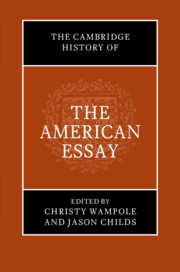Book contents
- The Cambridge History of the American Essay
- The Cambridge History of the American Essay
- Copyright page
- Contents
- Acknowledgments
- Notes on Contributors
- Introduction
- Part I The Emergence of the American Essay (1710–1865)
- Part II Voicing the American Experiment (1865–1945)
- Part III Postwar Essays and Essayism (1945–2000)
- 20 The Essay and the Twentieth-Century Literary Magazine
- 21 Germans in Amerika: Written Possibility, Uninhabitable Reality
- 22 The Essay and the American Left
- 23 The Native American Essay
- 24 Conservatism and the Essay
- 25 Opinions and Decisions: Legal Essays
- 26 World War Two to #MeToo: The Personal and the Political in the American Feminist Essay
- 27 Self-Portraits in a Convex Mirror: The Essay in American Poetry
- 28 The American Essay and (Social) Science
- 29 Philosophy as a Kind of Writing
- 30 The Essay and Literary Postmodernism: Seriousness and Exhaustion
- Part IV Toward the Contemporary American Essay (2000–2020)
- Recommendations for Further Reading
- Index
25 - Opinions and Decisions: Legal Essays
from Part III - Postwar Essays and Essayism (1945–2000)
Published online by Cambridge University Press: 28 March 2024
- The Cambridge History of the American Essay
- The Cambridge History of the American Essay
- Copyright page
- Contents
- Acknowledgments
- Notes on Contributors
- Introduction
- Part I The Emergence of the American Essay (1710–1865)
- Part II Voicing the American Experiment (1865–1945)
- Part III Postwar Essays and Essayism (1945–2000)
- 20 The Essay and the Twentieth-Century Literary Magazine
- 21 Germans in Amerika: Written Possibility, Uninhabitable Reality
- 22 The Essay and the American Left
- 23 The Native American Essay
- 24 Conservatism and the Essay
- 25 Opinions and Decisions: Legal Essays
- 26 World War Two to #MeToo: The Personal and the Political in the American Feminist Essay
- 27 Self-Portraits in a Convex Mirror: The Essay in American Poetry
- 28 The American Essay and (Social) Science
- 29 Philosophy as a Kind of Writing
- 30 The Essay and Literary Postmodernism: Seriousness and Exhaustion
- Part IV Toward the Contemporary American Essay (2000–2020)
- Recommendations for Further Reading
- Index
Summary
The relationship between the law and the essay, this chapter shows, is visible in the etymology of the latter. Derived from assayer, to try, and essai, or trial, the etymology connotes action, endeavor, and experiment aimed at proof leading to judgment. However, the essay as literary genre is often marked not by the finality of judgment but by levity, incompletion, indigestion, distraction, and exploratory attempts. The apparently antithetical senses of the essay – as comedic and judicial, frivolous and veridical, theatrical and juristic, popular and esoteric – are key to understanding its later development and certain specifically distinctive features of the “American” genre of legal exploratory discourse. This chapter shows the influence of pragmatism and egalitarian realism on American legal writing, offers examples of the legal polemics that unfolded in the pages of important American law journals, and argues that the importance of the essay form is to clear a space, to act out in ideas what practice has not yet tested, and so to become the theater that stages in advance the future of law.
Keywords
- Type
- Chapter
- Information
- The Cambridge History of the American Essay , pp. 425 - 440Publisher: Cambridge University PressPrint publication year: 2023
- 1
- Cited by

